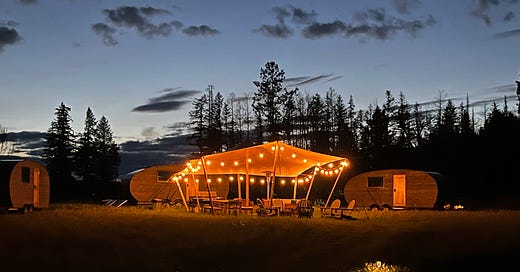Hospitality is Leaning into Transformation
Valuable trends and insights point to 'transformative experiences' as the future of hospitality.
Modern travel has diminished the potential of travel to create lasting impacts on our lives and our world, often void of depth, lacking meaning, and at times even dis’heart’ening. The commoditization of travel has led most “bookable experiences,” including hotels, to feel superficial, artificial, and soulless.
In this moment of uncertainty, chaos, loneliness, and disorientation, the market is longing for human connections, encounters with the deeply real, and something that stirs the soul.
The current paradigm of experience design, whether that be in hospitality, air travel, guiding, in our travel agencies and OTAs continue to swing and miss at the opportunity to help people feel uplifted and feel alive, not because they aren’t aiming for it, they just they haven’t evolved their thinking and transitioning from designing experience economy to guiding transformations.
The recent data and insights below shine a light on what’s missing in hospitality and how a transformative approach could help fill the vacancy.
Major wellness hotels stage top-line comeback from Hotel Investment Today
“Occupancy is holding steady, showing that travel demand remains strong,” said Michael Grove, CEO of HotStats. “But hotels can’t just ride the wave anymore — with revenue growth starting to soften, the real challenge is unlocking more on property spend, especially in wellness, where guest demand is high but monetization still lags.”
“As wellness offerings evolve, it’s clear that operational efficiency and targeted F&B concepts in minor wellness properties are driving profitability, while major wellness must look beyond traditional offerings to sustain growth,” said Edward Harvey, director at Elevate FB.
Important industry trends the Wellness Real Estate Report identified in 2025 include the return to foundational health habits increasingly driving wellness space design, experiences outvaluing opulence in luxury living, and hotels prioritizing sleep to repeat business, among others.
Solution: Transformative experiences increase average stay, drive loyalty, create more value, increase price, and average spend.
How Employee Wellness Is Becoming Hospitality’s Most Valuable Amenity
“The lodging industry is doubling down on employee wellness for good reason, says Denise Rousseau, a professor of organizational behavior and public policy at Carnegie Mellon University. The programs help employees manage job stress, which increases life satisfaction, reduces absenteeism and turnover, and improves employee satisfaction."
One study suggested that participation in the wellness program increased average worker productivity by over 5 percent. That's roughly equivalent to adding one additional day of productive work per month for the average employee.
It also affects the guest experience.
"When employees believe they work for a good employer, it spills over into the customer experience," says Rousseau. "Employees express positive feelings and go the extra mile."
Solution: Working in the transformation business instills a stronger sense of purpose, meaning, and belonging. Not many of us want to work in the ‘service industry,’ anymore, but who wouldn’t want to work in the ‘transformation business,’ helping improve lives, communities, and society?
The Luxury Travel Report 2025 by Preferred Hotels
Some valuable trends and insights from Preferred Hotels point to transformative travel as the future of travel.
The Luxury Travel Report 2025 by Preferred Hotels
Travel Desire is hot, but “Beige-ification” Makes Everything Feel Soulless. Travelers seek hotels with a unique identity, yet more than half of experienced “destination disillusionment,” where cities and stays feel indistinguishable.
In this recent study …
67% of those surveyed believe that Modern Luxury Hotels have sacrificed their soul for standardization.
77% of those surveyed agree with the statement that, “I’m tired of travel itineraries that feel designed by an algorithm rather than authenticity.
95% agree, “If an accommodation truly aligns with my taste and preferences, I am willing to increase my budget to stay there.”
61% want “once in a lifetime, awe-inspiring moments”
57% crave “connective and bonding moments”
45% want “transformational moments”
47%, the highest % of respondents, say that “Confidence that the hotels in the program will provide high quality experiences” is the most important in loyalty programs, desiring to provide quality and a sense of value.
Solution: A transformative experience strategy is highly personal, authentic, and more impactful, and helps travelers create positive, enduring change in their lives. Further, a transformative approach to our consulting and training is needed to help with the absorption and activation of the new strategy, approach, frameworks, and techniques. This cultivates the individual, team, and culture's sense of purpose, essence, and identity. That’s how you create the conditions for more transformations. A truly transformative hotel doesn't just market transformations; it lives and breathes transformation, and this creates holistic value and benefit for all.
***
Change is hard, unlearning old ways and embracing a transformative hospitality strategy will take time; it’s not a light switch, it’s a path walked with inspired, intentional, and practical steps. I love leading leaders and other hospitality and tourism professionals down this path.
Photo Courtesy of Beyond Retreats/ROAM Beyond




